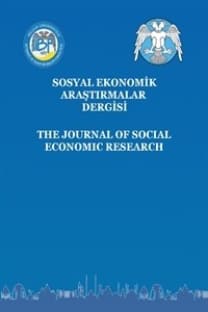ÇEVRECİ YÖNELİM, ÇEVRE DOSTU DAVRANIŞ VE DEMOGRAFİK ÖZELLİKLER: ÜNİVERSİTE ÖĞRENCİLERİ ÜZERİNDE BİR ARAŞTIRMA
Çevreci yönelim ve çevreye duyarlı davranış ile tüketicilerin demografik özellikleri arasındaki ilişkiyi inceleyen araştırmalarda çelişkili sonuçlar elde edilmiştir. Bu nedenle, söz konusu ilişki, pazarlama yöneticileri için halen önemini koruyan bir araştırma konusudur. Çevreci pazarlama için önemli bir hedef grubu olan genç ve eğitimli tüketicilerin çeşitli demografik özellikleri ile çevreci yönelim ve çevreci davranış eğilimlerinin geniş bir örneklemde incelenmesi, konuya bir ışık tutabilir. Bu araştırmanın amacı, üniversite öğrencilerinin çevreci yönelimleri ve çevreci davranış eğilimlerinin, demografik özelliklerine göre farklılık gösterip göstermediğinin belirlenmesidir. Veriler, Marmara Bölgesi’nde yerleşik yedi ayrı üniversite okuyan 1254 öğrenciden anket yöntemiyle toplanmıştır. Verilerin analizinde tanımlayıcı istatistikler, korelasyon ve varyans analizleri kullanılmıştır. Yapılan analizler sonucunda cevaplayıcıların çevreci yönelimlerinin cinsiyet, yaş, eğitim düzeyi ve ailenin aylık gelir düzeyine bağlı olarak farklılaştığı belirlenmiştir. Cevaplayıcının çevre dostu davranış niyeti de yaş, cinsiyet ve ailenin yaşadığı yerleşim yerine bağlı olarak farklılaşmaktadır. Çevreci yönelim ile çevre dostu davranış arasında pozitif yönlü bir korelasyon bulunmaktadır.
Research aiming to find out the relationship between consumer demographics and proenvironmental orientation has revealed equivocal results. Thus, the possible variation of proenvironmental attitude and behaviour related to consumer demographics is a significant research question for marketing managers. Investigating how, if any, young and educated consumers’ demographic characteristics correspond with pro-environmental attitudes and behaviour may shed some light on the issue. The objective of this study is to find out, whether university students’ pro-environmental orientation and attitudes differ according to their demographic characteristics. Research data is obtained from 1254 university students studying at seven different universities located on Marmara Region of Turkey through questionnaires. Descriptive statistics, correlation and analysis of variance were used to analyze the data. It is found that, pro-environmental orientation is affected by gender, age, education level and family income of the respondents. Environmentally friendly behaviour is affected by age and gender of the respondent as well as the size of the settlement (e.g. village, county or metropolis) where the respondent’s family resides. Further, there is a positive correlation between pro-environmental orientation and environmentally friendly behaviour.
